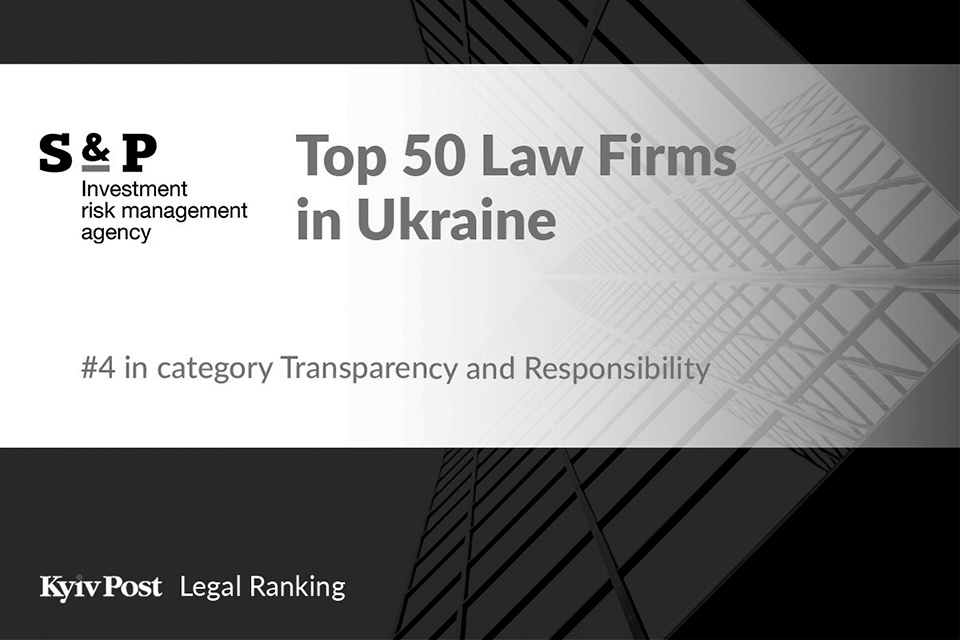Nataliia Osadcha, the co-founder of S&P Investment Risk Management Agency
Throughout the entire period of the Ukrainian state formation, business was accompanied by political and economic instability. Six presidents have changed during 27 years of the development of Ukraine, we have experienced two revolutions, a complete transformation of external state relations and a country’s development course.
At the same time, business remains the most sensitive to political changes throughout all the stages of the development of Ukraine, especially during the re-election of the president and parliament of the country, change of government. Every change is a separate epoch with its own rules, goals and consequences both for the country and for the business as a whole. At all times, stability remains the main goal for business, as well as saving assets and obtaining planned profit, regardless of any political fluctuations and changes.
After the second revolution – Revolution of Dignity – with the start of hostilities in the Donbas and the annexation of the Crimea, our country experienced a deep political and economic crisis. However, , macroeconomic performance has improved recently. Ukraine has begun to show steady economic growth. From an economic point of view, the financial crisis has made the country more attractive to foreign investors: inflation, falling asset prices, a decrease in the cost of labor and production costs. At the same time, the decline in investment in recent years was mainly due to military actions, despite the fact that the war was not at an active stage.
There is tough competitiog during the period of markets’ consolidation. Large international business is trying to find new, economically interesting markets, especially, if these markets are geographically located in Europe. Ukraine is exactly such a market. What makes Ukraine an attractive country for foreign capital:
- there is no free agricultural land market (due to the moratorium on the sale of agricultural land);
- the privatization of large state enterprises which are interesting for large foreign players, has not yet completed;
- there are no toll roads, and public-private partnership is just beginning to emerge;
- the largest area in the center of Europe with the population of 42.3 million people;
- more than 42 million hectares of agricultural land.
All this is impressive, still, there are risks inherent in the developing countries, and Ukraine is no exception. Every five years, a large-scale change of political power takes place in the country, which leads to changes in legislation and, sometimes, even the entire course of the country’s development.
Ukraine is now again on the verge of political change, and forecasts are extremely different: from the complete crisis to an unprecedented victory of democracy. Honestly speaking, nobody can give a clear forecast of how events will develop and what changes will take place. Time will tell.
The second major risks are business ones. This category includes changes in the business climate and legislation announced by the previous government and the president declared in regulations and “rules” of doing business in Ukraine. The main risk, like 27 years ago, when Ukraine had just started its way as an independent state, remains the risk of losing assets. In fact, this risk has become less relevant over 27 years, as in other developing countries. Another important risk remains financial one associated with economic performance. Political, business and financial risks are interconnected, they interact closely and are the result of each other.
In fact, the above-mentioned risks in an economically attractive environment is not something unique for Ukraine. Any developing country is a market with potentially high risks and at the same time high profit rates. To be successful in any developing country, you need to learn how to correctly calculate these risks, that is, consciously accept the fact of their existence and learn how to manage them. Risk management exists exactly as long as humanity exists. It is just that the term is not familiar to everyone, but this does not mean that we do not do these actions for 24 hours every day. Going out of the house, we are looking at the weather forecast and choose clothes according to it, we take or not take an umbrella, calculate the time spent in traffic jams to get to the scheduled meeting on time. In the snowfall, we change the wheels of our cars, set the alarm signal in houses or apartments for the safety of our lives, minimizing the risk of a possible unwanted intrusion. We constantly calculate our risks, but not always, we do that in business.
To protect your business from loss of assets and other risks, the first rule is to clearly understand the existence of risks, identify the threats they carry and determine how to manage them.
As a risk minimization specialist and a business consultant with more than 20 years of experience in asset protection and risk minimization in Ukraine, I can say that you can not only calculate a lot of risks, but also successfully minimize them. And if, after analysis, it turns out that the risks are very high and their minimization or prevention are impossible, you can save time, money and health simply by stopping such an unjustifiably risky business project.
So, where does risk management begin, and at what stage is it better to apply it in the realities of Ukraine? The risk management process must be implemented at the earliest stage of a business project. The perfect start is the stage of a business plan (calculation, analysis, the formation of financial indicators, ownership structure, partnership, the procedure for acquiring assets and their structure, management, etc.). At at this stage, risk management is not only necessary, it is vital for the implementation and receipt of what has been carefully calculated by experts in the business plan. When we calculate risks at the “zero” stage, we take into account everything that can at least somehow adversely affect the implementation of the project in the future or lead to the loss of an asset. Political risks will not be so important or fundamental factor if attention is paid to mechanics. Properly structured partnership relations (taking into account the system of checks and balances), the correct procedure for acquiring an asset and structuring a transaction, the stage and process of starting construction work, are correctly defined. They will give you high guarantees, and regardless of the change of power in the country and political balance of power, you will remain with your business. There are actually a lot of examples. Let’s see how many foreign companies which “entered” the country during the period of political cataclysms, are still doing business successfully. Some have been successful in Ukraine for over 27 years. And no matter during what period of political relations these companies “entered” the market: if the risks are calculated correctly, they will remain here for a very long time. There are also a lot of negative examples when a business lost millions or even hundreds of millions of dollars. Unable to cope with risks, they simply left the Ukrainian market, having suffered multimillion-dollar losses. I’ve been studying such situations for a long time, so, I can say that in 90 percent of negative cases, investors made significant mistakes. Mistakes often occur at the beginning stage of the business plan implementation. The main mistake is that companies do not identify the Ukrainian market as high-risk, do not accept this fact as a necessary element of the formula. If this element is not taken into account in the formula, all components of your business plan will fail. And the company will not get the planned business and financial results. Investors make different mistakes:
- hopes that the guarantees given to them by the government will be respected (for a political change of power every five years it is unreasonable to rely on government guarantees, which perhaps will not be at this time);
- hopes that partners will be honest and keep their word (will not be, if you do not force this, will not make the partner unprofitable to violate the agreement);
- hopes that small legal inaccuracies will not have significant consequences (as practice shows, there were always minor inaccuracies in the basis of the most complex conflicts);
- the hope that nothing bad can happen to you, so, there is no need to spend money on insurance. As practice shows, 95 percent of success is the detailed preparation and calculation of all possible risks and probability of these risks occurring. This statement is true regardless of whether you go to the mountains, plan diving, rafting or prepare for serious investments in a country like Ukraine. Without a detailed plan, guide and risk calculation, this is a frivolous and risky undertaking with an uncertain outcome.
Implementing risk management process during the formation of a business plan gives a high chance of success. At the stage of the business functioning, risk management should already be implemented directly in all business processes of a company and, especially, in management decision-making processes.
For example, the decision to start building a large business object should not only include risk auditing, but also be the subject of discussion at the highest level of company’s CEO and business owners, the conscious acceptance of the identified risks and taking steps to minimize them.
Companies which are not only engaged in long-term planning but also have a precise coordinate system which helps to get into the planned future, have been and will remain successful. However, without a conscious risks calculation, this does not seem possible.
S&P Investment Risk Management Agency is a multi-level consulting company. Our company has been accompanying a large foreign business in Ukraine for almost 12 years. Our main directions are risk management, crisis management (taking companies out of crises of different complexity levels), reputational protection (essential factor for overcoming crises), and legal services. Our specialists combine various expert knowledge and deep practical experience as crisis managers, business consultants, PR specialists, GR, lawyers, tax agents, investigators, detectives, strategy consultants, and many other professions. This combination distinguishes S&P Investment Risk Management Agency among other companies. We calculate and minimize for the business in Ukraine the following types of risks: business, investment, financial, reputational and legal ones.
We act as business consultants for companies with the purpose of preventing business conflicts and their actual avoidance, and minimizing potential negative consequences. For those companies that are already in a business conflict, for example with a client, counterparty, competitor or government/law enforcement agency, we not only develop a strategy for successful conflict resolution, but we also use various tools and accompany the business until the successful conclusion of a crisis/conflict. Moreover, our high-level lawyers allow us to provide our clients with a full range of consulting services. At the same time, the essential difference between our company and the classical legal consulting is that the legal strategy that we develop is derived from the risk management and crisis management strategies. Therefore, legal instruments are selected and provided to the client together with a risk minimization strategy. In this case, the legal strategy itself and its implementation are fundamentally different from standard legal tools and moves.
Despite the fact that legal services are only one of the lines of our company activity, it is highly appreciated by leading independent ratings and experts. This year, the experts of the Kyiv Post editorial office conducted the first independent study of the legal services market in Ukraine. S&P Investment Risk Management Agency is in the TOP 50 of the best law firms in Ukraine and occupies 4th place in the category “Transparency and Responsibility”. For us, the high appreciation of the Kyiv Post is a very important indicator of our expertise and achievements.








